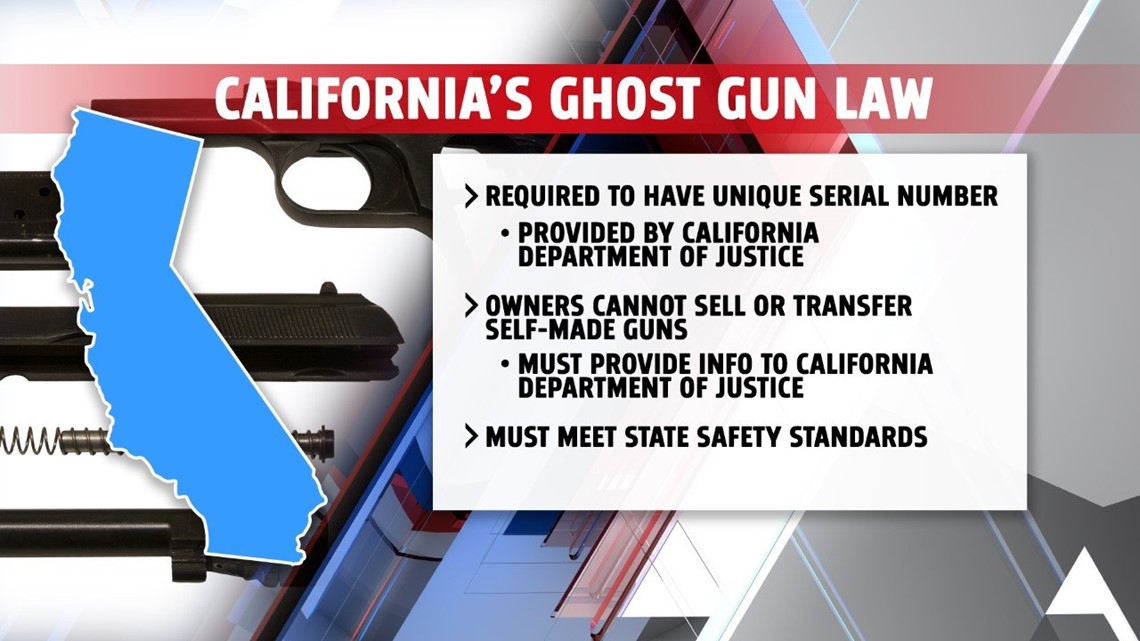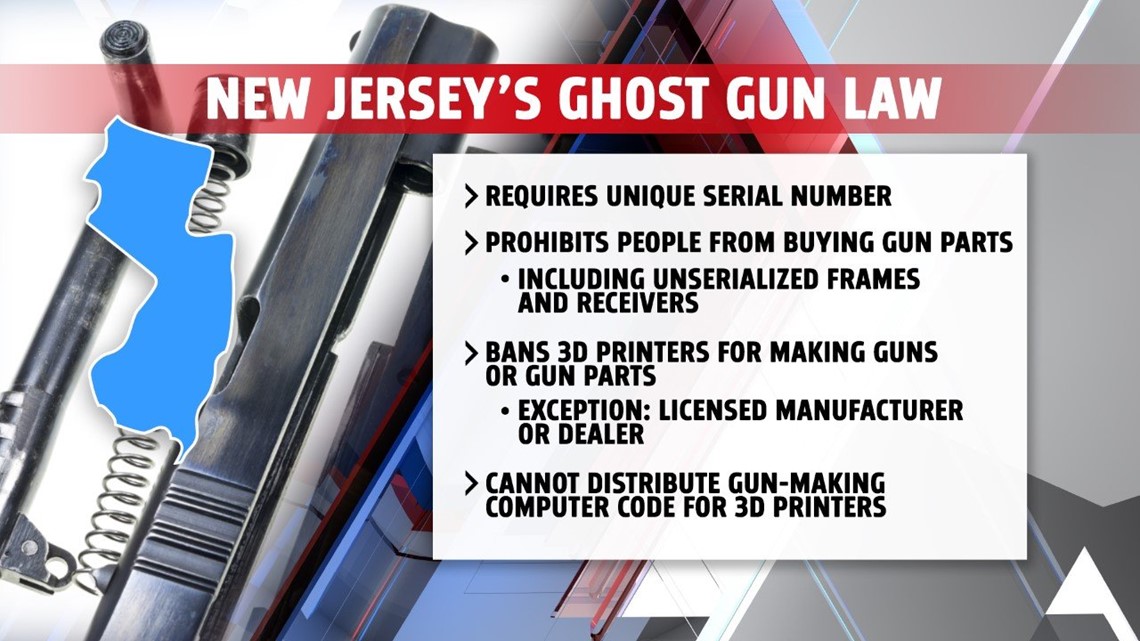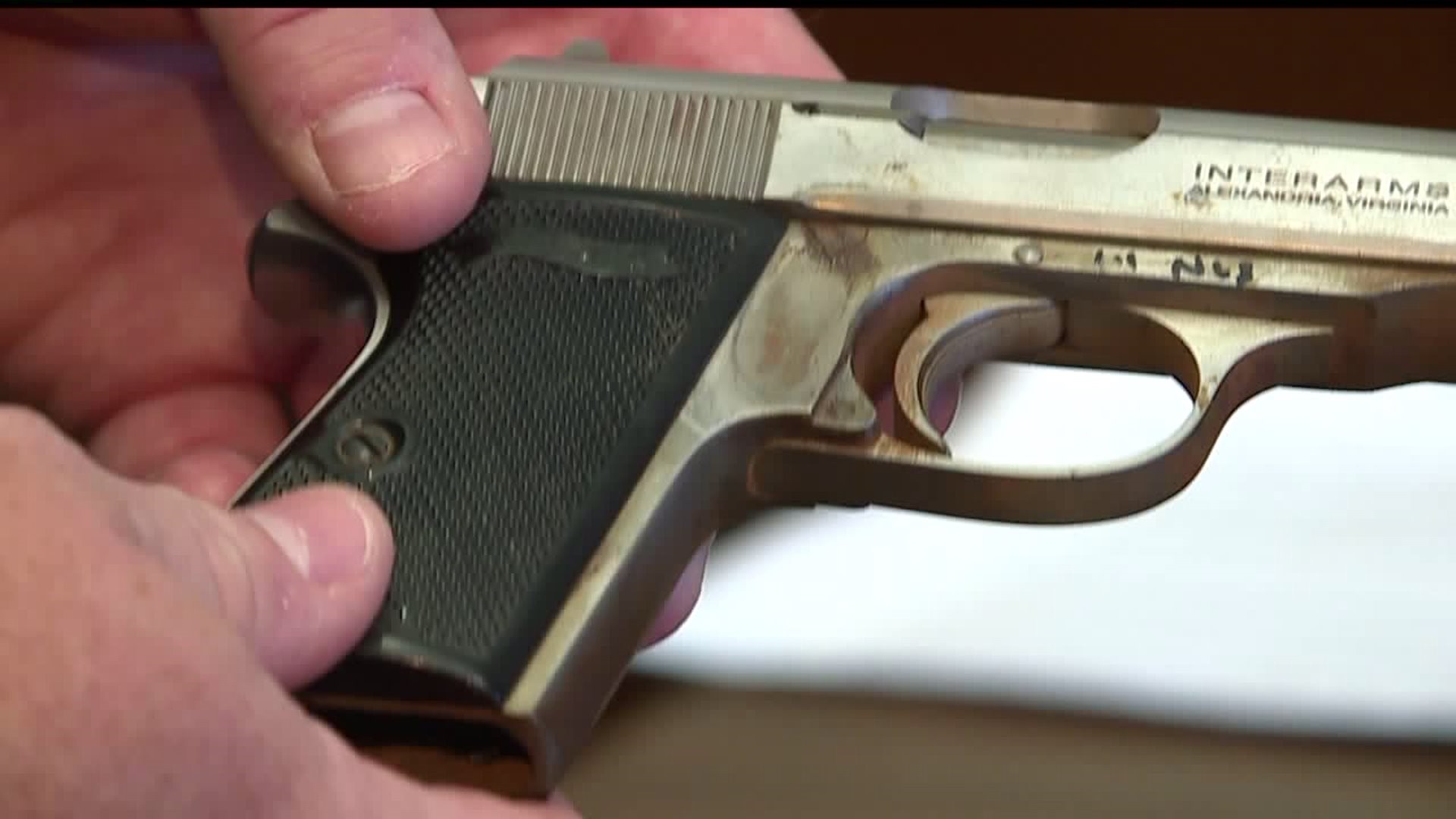HARRISBURG, PA. - For some, gun violence in Pennsylvania is a dim reality. Whether someone is hurt in a drive by shooting, or someone uses one to take their own life, guns have the capacity to ruin lives. While controlling and regulating guns remains a controversial subject in Pennsylvania, the ability to prevent them from falling into the wrong hands is one issue both sides of the aisle can come together on.
Getting illegal guns off of the streets, and creating the tools and instruments to help law enforcement make that happen, is paramount to curbing gun violence. But this becomes particularly tricky when the guns are created at home.
Anyone can assemble a home-made gun, or ghost gun, using parts bought online. But it's not just the accessibility of the parts that causes concern. Ghost guns cannot be traced. That's because the makers do not serialize their guns, which is a key component for police to trace their origin. Without serial codes on guns, police departments struggle to find whoever originally handed off the gun to a criminal.
As of October 2019, the York City Police Department's Gun Violence Intervention Program recovered roughly 70 illegal guns this year, with some of those also being made with parts. "Some of these guns are turning up, being taken off of gang members, found at homicide scenes..." ATF Special Agent in Charge, Don Robinson, told Fox43 Reveals earlier this year, "there's no national registration, but the dealers keep records for a reason; so that we can go back and law enforcement can have leads to follow up on."
Pennsylvania is not keeping track of ghost guns in the Commonwealth.
At the federal level, The Bureau of Alcohol, Tobacco recovered 42 ghost guns in Philadelphia between June 2018 and June 2019.
In Delaware County, Upper Darby police arrested a high school student in April 2018 after he threatened to shoot up his school. The Upper Darby Police Superintendent said the suspect, who was a foreign exchange student, assembled a handgun using parts he bought online. Police didn't charge him for owning the weapon or the ammunition, but he was charged with making terroristic threats.
The U.S. Attorney's Office for the Eastern District of Pennsylvania later charged him with being an alien in possession of ammunition, and the suspect plead guilty. He was later deported by Immigration and Customs Enforcement.
It's not just a problem in Pennsylvania's cities, but in the country, too.
A Pennsylvania State Trooper shot and killed a man outside a Walmart in Lehigh County, near Allentown, when the suspect pointed a .40 Caliber Glock at him. State Police said the suspect in that case bought the parts for the gun online as well.
The ability to make a gun without a serial number is happening more frequently with 80% receivers, or receivers that have not been completely manufactured. While they're not finished, 80% receivers can be turned into fully-functioning firearms and don't have serial numbers, unlike complete receivers.
Until today, receivers were defined as firearms, but 80% receivers were not. State Attorney General Josh Shapiro released a legal opinion today to reclassify 80% receivers in the same capacity as regular receivers. Doing so requires background checks on all 80% receivers sold in the state.
During a news conference this afternoon, Shapiro explained how easy it is for 80% receivers to fall into the wrong hands. "During a gun show this summer in York, our agents observed a prohibited purchaser making an 80% (receiver) into a functioning firearm, without even leaving the gun show."
It's now up to Pennsylvania State Police to implement the policy.
It's not the first time Shapiro has taken action to crack down on illegal guns in Pennsylvania. Earlier this year, he announced the start of the Track + Trace program. It's an initiative to help Pennsylvania law enforcement agencies collect data on illegal gun transfers and gun trafficking cases, in order to reduce the number of them.
According to the State Attorney General's Office, 1,500 Pennsylvanians die from gun violence every year. That number includes firearm-related suicides, which make up the biggest number of gun deaths. The Bureau of Narcotics traced 390 guns found during drug transfers back to when they were illegally sold.
Pennsylvania State Police has tools to help track illegal guns and gun sales, but it's pushing for licensed firearm dealers to submit records of sales electronically, as opposed to a paper system. there is a nine- to 12-month backlog of record of sale forms waiting to be entered into a database.
Keeping track of illegal or unregistered guns becomes even more daunting when you factor in the potential for 3D-printed guns. Anyone with a 3D-printer can create the parts to build a gun as long as they can access the blueprints for one. There are multiple blueprints online. Like ghost guns, 3D-printed guns do not have serial numbers, and currently they're not required to have one under state law.
A group of Pennsylvania lawmakers is hoping to change that. Members of the Pennsylvania Safe Caucus re-introduced bills earlier this year to update the Pennsylvania Uniform Firearms Act to classify 3D-printed guns as firearms. The bills would also bar people from printing a 3D-gun without a federal firearm manufacturing license. Those bills were last referred to the State House and Senate Judiciary Committees in March.
Last year, the US State Department reversed an Obama-era decision that banned websites from posting 3D gun blueprints online, such as Defense Distributed.
Attorney General Shapiro then joined 18 other Attorneys General in suing to get the ban to be upheld. And in November, a federal judge ruled in favor of Pennsylvania, and 18 other U.S. states, in preventing the blueprints from being accessible.
The website had been selling the blueprints as a previous court order only stopped it from posting the prints for free.
Under last month's ruling, the site had stopped selling them.
There is some debate as to how effective 3D-printed guns really are. Probation officers in Sacramento, California found a man, who was on probation for illegal possession of a firearm, with a 3D-printed gun. Police said the gun wasn't functional and the suspect didn't finish it because it was too much work.
A 3D-gun manufacturer, also based in Sacramento, California, said it is not convinced 3D-printed guns are safe. He argued the material used to build them is very similar to the plastics used to make legos.
While Pennsylvania takes action to keep better track of illegal, ghost, and 3D-printed guns, two states have already enacted dramatic reforms to prevent those firearms from falling into the wrong hands.


In 2016, California enacted a law imposing multiple requirements on anyone who manufactures or assembles a firearm. The law, which went into effect in 2018, requires self-made guns to have a unique serial number provided by the California Department of Justice. It also mandates gun owners to provide information about the newly-serialized firearms, including their own personal information to the CA DOJ.
Furthermore, anyone who had a gun without a serial number when the law went into effect last year has to apply to the DOJ for one and they have to put it on the gun. If they don't, they have to turn it over to police. Consequentially, people and companies are expressly prohibited from helping anyone, who is not allowed to own a firearm under California state law, with manufacturing or assembling a gun.
Finally, the homemade guns have to be compliant with the California Unsafe Handgun Act, so they meet safety requirements.
Over in The Garden State, New Jersey's Ghost Gun Law is considered the most comprehensive of its kind in the country.


Under the law, which went into effect in 2018, people are prohibited from buying or acquiring firearms parts, including unserialized frame or receivers, "from which a firearm without a serial number may be readily manufactured or otherwise assembled." It also bans using 3D-printers from printing guns or gun parts, including receivers and magazines, unless the printer is a state-licensed firearm manufacturer or dealer. It also bans the distribution of computer code that can create the gun parts or guns.
The law also expands the federal ban on undetectable firearms so the major components of one have to be detectable by security-screening devices.
Like California, New Jersey's ghost gun law also requires registered serial numbers on all firearms.
As Shapiro continues to tackle gun violence in Pennsylvania, gun-rights advocates continue to voice concern. But the State Attorney General argues today's legal opinion doesn't make any firearms illegal, so it doesn't infringe on anyone's Second Amendment rights. He said those sorts of concerns dodge the issue at hand, "too many criminals have taken advantage of these loopholes to gain access to guns that they should never have had to begin with. We’ve read the same headlines, had the same emotional reactions, submitted to the same numbness, rinse and repeat.”

